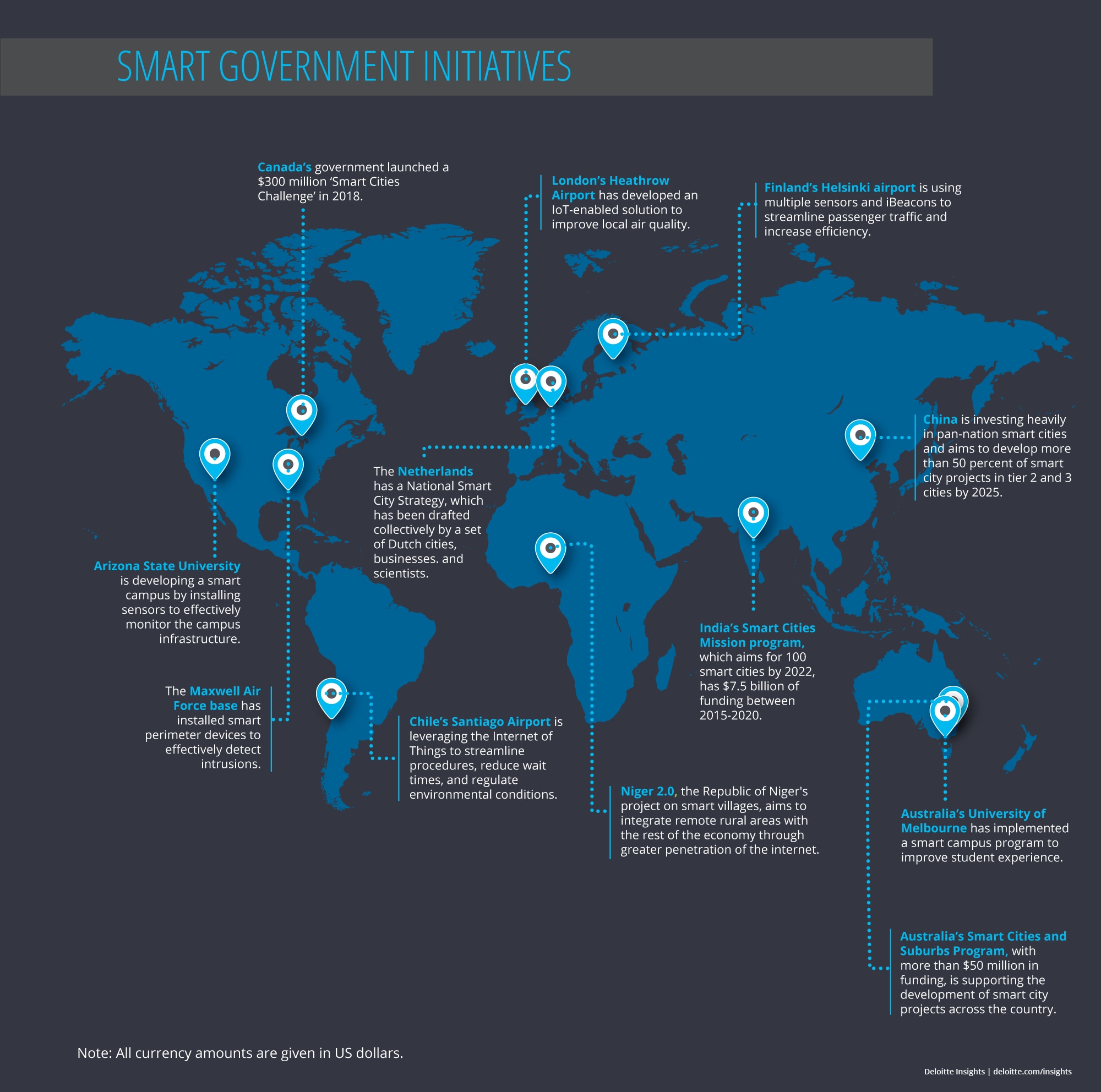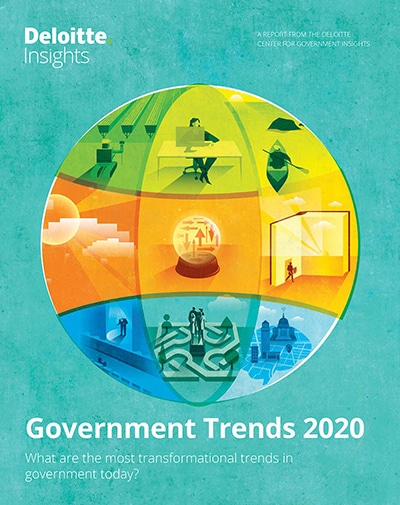
Smart government Smart city solutions for the public services landscape
6 minute read
24 June 2019
The concept of smart cities has expanded to cover a variety of smart domains and public spaces, which use technology to better serve citizens and enhance many aspects of public life.
Ever wondered what it would be like to live in a place where public services are managed by vast swathes of data, technology, and customer-focused analytics? Imagine a seamless drive to work, a streamlined waste management system, and data-driven energy usage. Yes, technology has the power to transform the places in which we live. What began with the notion of “smart cities”—integrated, connected, and sustainable communities—has expanded to cover a variety of “smart” domains and public spaces, including states, multicity regions, campuses, and military bases. These places use technology to serve citizens in a comprehensive manner and enhance many aspects of public life, including quality of life, mobility, security, education, economy, and the environment.
Three key components enable the “smart government” or “smart enterprise” movement globally:
- Smart ecosystems. Governments are increasingly building public-private ecosystems to solve some of the biggest societal issues including health care, mobility, education, and workforce development. These ecosystems are tapping into the collective intelligence of the private sector, academia, technology startups, think tanks, and even citizens.
- Smart connectivity and data. The advancements in sensor technology and the growing ubiquity of the Internet of Things (IoT) are blurring the lines between the cyber and physical worlds. The convergence of cyber and physical is enabling government to track, monitor, and manage resources and make data-driven decisions.
- Smart platform and engagement. There is a new information-sharing partnership between government entities, residents, and businesses. Governments are using technology to enable civic participation and leverage decentralized expertise to reinvent and overhaul core services. In other words, data + smart citizens = better city decisions.

These core components are causing a tectonic shift in the public service landscape from smart cities to smart airports to smart rural communities.
Smart regions—coordinating across governments. The concept of smart regions includes a broad array of places and services. For instance, the Greater Phoenix Smart Region initiative brings together 22 cities and towns in Maricopa County to drive regional technology pilots and provide test beds for researchers to try out new solutions for public services.1 Smart multicity regions should transcend city boundaries to drive more inclusive and expansive innovation. Moreover, cities also realize the benefits of pooling resources and are able to tap into economies of scale as they seek to use seamless physical-digital experiences to deliver traditional city services to citizens in entirely new ways.
Smart campuses—improving how we learn. Moving beyond traditional digital classroom and education initiatives, the campuses of smart universities are acting as test beds for the broader smart city movement. A smart campus uses artificial intelligence, machine learning, blockchain, and other emerging technologies to automate processes, monitor and initiate workflows, and improve data-driven decision-making for various stakeholders.2
The University of Washington, for example, is piloting a smart grid project, installing more than 200 smart meters across the campus in an effort to drive down energy consumption on campus.3 Similarly, the University of Wisconsin-Madison has created a test bed to pilot multiple connected-vehicle and autonomous-vehicle projects on a 6.2-mile corridor adjacent to the campus.4 The pilot is timely since it is becoming increasingly imperative to enable vehicles interact with each other in the wake of the challenges posed by autonomous vehicles.
Smart airports—improving how we move. Many transportation providers are taking smart mobility advances from pilot projects to the real world. For example, some smart airports now use Wi-Fi access points as sensors to measure the location and dwell time of travelers as they move through the terminals. The data currently helps these airports place messaging and advertisements, but it can also lay the foundation for more individualized travel services.
Smart technologies can provide broader benefits to others beyond those directly using them. For example, London’s Heathrow airport uses an IoT solution to identify auxiliary power units (APU) running on the tarmac. The data can be used to remind airlines to switch off these units if kept running beyond the required schedule. By cutting down the time these APUs run, Heathrow has been able to reduce nitrogen oxide emissions and improve air quality around the airport.5
Smart bases—improving security. As with the environment, smart technology in one area can improve government services in others, such as integrating smart cities with nearby military bases. The city of San Diego has signed a memorandum of understanding (MOU) with the Marine Corps Installations Command to collaborate on smart city programs. The MOU will help the city tap into the Marine Corps research on renewable energy and water conservation, while the city will extend some of its existing programs such as smart street lights and a city services mobile app to the base.6
Smart rural communities—improving rural economies. Smart technology can also be instrumental in bringing government services to areas that have lacked them, helping the local economy. For instance, in the past four years, India has been able to bring each village into the national power grid under the National Rural Electrification initiative,7 making rural agriculture easier and improving people’s living standards. In another example, Purdue University is collecting more than 1.4 petabytes of data daily on its 1,400-acre research farm in an effort to improve the nutritional value of plants.8
The smart government movement is not without its own set of challenges, chief among them funding and data governance. Technology costs money, and, for many governments, funding or financing smart projects can be a thorny issue—which is why some countries are taking a broader national approach to funding these. The India Smart Cities Mission program aims to develop 100 smart cities by 2022.9 More than 5,000 Smart City projects of different sizes and nature, worth about US$29 billion across these 100 cities, have been approved under the Smart City Mission and are under various stages of implementation.10
Further challenges of smart spaces could emerge after these spaces are built. As smart spaces increasingly link the cyber with the physical worlds, cyberattacks and vulnerabilities can have serious real-world effects. For example, thousands of homes lost power in a cyberattack on Ukraine’s power grid.11 Plus, with so much data being used in smart spaces, governments should address the privacy concerns of their citizens. The Quayside project in the city of Toronto has faced resistance from residents over a lack of transparency around privacy and security of citizen data.12 Going forward, governments will need to create greater awareness about the benefits of their prospective projects. Not only will this help build greater transparency, it will also enable greater constituent buy-in.
It’s important to have a North Star for the smart government movement, but the progression should be viewed as a journey. It’s also important to emphasize the ROI for any smart initiative, as orienting it toward the larger mission will be critical for the success of any smart investment.
Data signals
- There will be more than 50 billion connected devices by 2020.13
- US$12 billion is the estimated market for sensors in security-related applications by 2023, up from US$6.3 billion in 2016.14
- US$225.5 billion is the expected global market size for smart city services in 2026, a steep rise from US$93.5 billion in 2017.15
Moving forward
- Identify the goal. Identify the North Star of developing smart government. Create a business case based on a robust evaluation of costs and benefits. The business case should clearly reflect the expected ROI.
- Explore appropriate sources of financing. In the absence of adequate funding, follow a structured approach to exploring alternate funding and financing options, keeping in mind the ultimate objective and the timeline.
- Build and manage an ecosystem. Build ecosystems around key areas such as health care, transportation, and education to drive dynamic and collaborative networks that include the private sector, startups, think tanks, academia, and citizens.
- Address the skills gap. Identify if the current pool of talent has the adequate skills to work with big data and predictive analytics. If not, hire the right talent and train the existing staff.
- Build a robust cybersecurity framework. An integrated and interoperable system increases the risk of a systemic failure. Thus, make security the foremost priority.
Potential benefits
- Better quality of life for residents and visitors;
- Economic competitiveness to attract industry and talent; and
- Environmental sustainability.
Risk factors
- Greater cyber risk;
- Struggling with smart city governance, especially data governance;
- Deficient funding and financing; and
- Lack of strong leadership.
Read more about smart governments in the Smart cities collection.
Explore the collections
-
Cloud as innovation driver Article4 years ago
-
Introduction Article4 years ago
-
Innovation accelerators Article4 years ago
-
Nudging for good Article4 years ago
-
Citizen experience in government takes center stage Article4 years ago
-
Government Trends 2020 Collection4 years ago
















